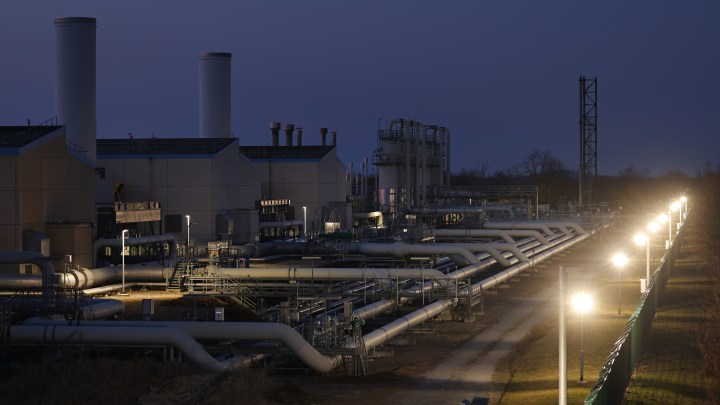
Europe, moving away from Russian natural gas, looks to the U.S.
Europe, moving away from Russian natural gas, looks to the U.S.

Germany is urging citizens to conserve energy as it braces for Russia to cut natural gas supply or even potentially halt it entirely.
For a long time, Germany paid Russia in euros. Now, Russia is demanding payment for that gas in its own currency, rubles. That’s causing Germany — and its neighbors — to hunt for alternatives.
Europe was in the throes of an energy crisis even before Russia’s invasion of Ukraine. Consumers there pay five times more for natural gas than in the U.S, said Pavel Molchanov, an energy analyst at Raymond James.
“The war made that crisis even worse, with the most expensive natural gas in world history,” he said.
Up until the invasion, natural gas from Russia made up 55% of Germany’s imports. That’s down to 40% so far this year.
“It’s a stark reminder that energy security needs to be carefully thought about and managed,” Molchanov said.
Natural gas is used in everything from producing chemicals and fertilizer to heating homes. As winter ends, prices usually fall. Not this year, said BMO Capital Markets’ Randy Ollenberger.
“You know, we’re going through a massive market shift here as people realign their sources of supply,” Ollenberger said.
The U.S. is sending more natural gas overseas than ever. Last week, the White House vowed to export enough of the stuff to make up one-third of what Europe now gets from Russia.
“From a geopolitical standpoint — let alone economically, you know — this allows us to provide incredible support to our allies and partners around the world,” said Marty Durbin, president of the Global Energy Institute at the U.S. Chamber of Commerce.
Weaning Europe off Russian gas in the long term has consequences: reduced supply will mean higher prices here at home.
There’s a lot happening in the world. Through it all, Marketplace is here for you.
You rely on Marketplace to break down the world’s events and tell you how it affects you in a fact-based, approachable way. We rely on your financial support to keep making that possible.
Your donation today powers the independent journalism that you rely on. For just $5/month, you can help sustain Marketplace so we can keep reporting on the things that matter to you.











